 Did you have to read The Stranger or maybe some Sartre in school? If so, you know something about existentialism. If not, or if you need brushing up, here's Merriam-Webster:
Did you have to read The Stranger or maybe some Sartre in school? If so, you know something about existentialism. If not, or if you need brushing up, here's Merriam-Webster:
ex·is·ten·tial·ism: a chiefly 20th century philosophical movement embracing diverse doctrines but centering on analysis of individual existence in an unfathomable universe and the plight of the individual who must assume ultimate responsibility for acts of free will without any certain knowledge of what is right or wrong or good or bad
Okay, so that's existentialism. What's existential therapy? And will this be on the social work licensing exam? To the second question, the answer is, could be. Maybe. You can probably pass the exam without having the first clue about what existential therapy is. This is not a topic to sweat or cram or otherwise worry yourself with.
The first question--what is it?--takes a little more space to answer. Some might argue that all therapy is existential therapy--that is, all approaches to treatment have to grapple with client's sense of powerlessness, aloneness, and with mortality and free will. Existential therapy makes those grapplings central to treatment.
What that might look like: A conscious effort is made in existential therapy to explore questions of...existence. Death--and denial of death--are addressed head-on. What is the client's experience of death? Of funerals? What beliefs does the client have about death? Same goes for the rest of the list above (powerlessness, etc.). Explore, examine, repeat. For much more on the topic, you can try Irvin Yalom's Existential Therapy.
For a more easily digested amount of detail, here's the web:
Happy test prepping and good luck on the exam!
***
For practice questions covering a wide range of social work topics, including existential therapy, sign up!

 Did you have to read The Stranger or maybe some Sartre in school? If so, you know something about existentialism. If not, or if you need brushing up, here's
Did you have to read The Stranger or maybe some Sartre in school? If so, you know something about existentialism. If not, or if you need brushing up, here's